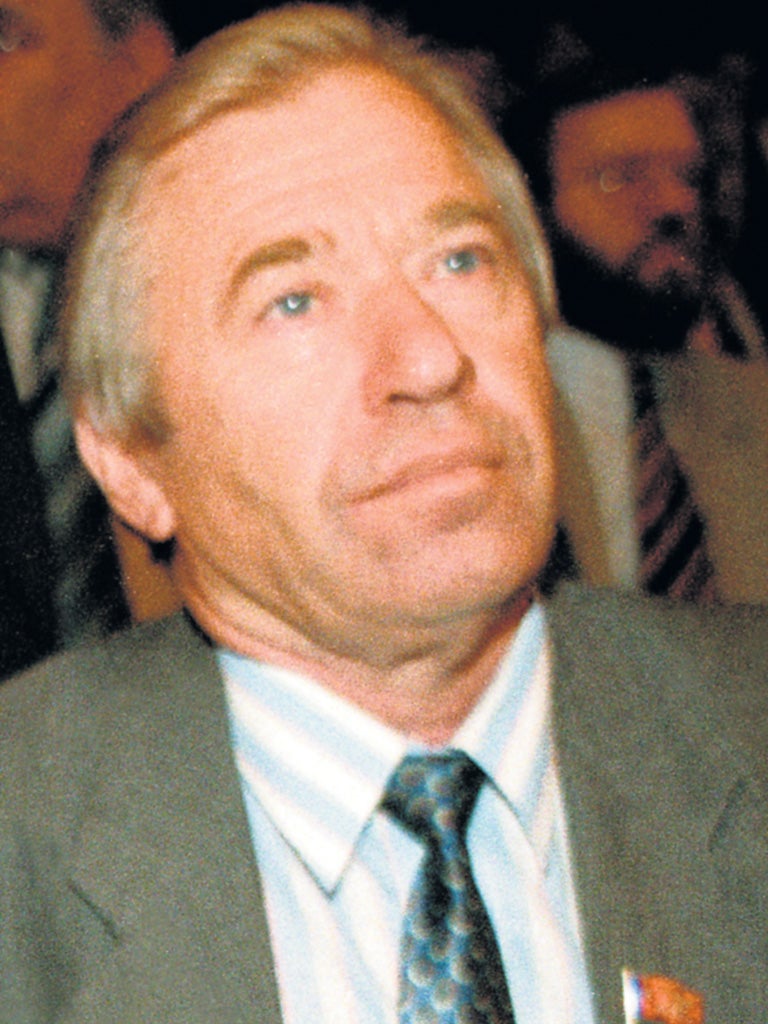Vasily Starodubtsev: Politician who tried to topple Gorbachev in 1991

Your support helps us to tell the story
From reproductive rights to climate change to Big Tech, The Independent is on the ground when the story is developing. Whether it's investigating the financials of Elon Musk's pro-Trump PAC or producing our latest documentary, 'The A Word', which shines a light on the American women fighting for reproductive rights, we know how important it is to parse out the facts from the messaging.
At such a critical moment in US history, we need reporters on the ground. Your donation allows us to keep sending journalists to speak to both sides of the story.
The Independent is trusted by Americans across the entire political spectrum. And unlike many other quality news outlets, we choose not to lock Americans out of our reporting and analysis with paywalls. We believe quality journalism should be available to everyone, paid for by those who can afford it.
Your support makes all the difference.As head of the Collective Farms Council – and not a disaffected general or security chief – Vasily Starodubtsev made an unlikely putschist. Yet there he sat at the Foreign Ministry Press Centre on the afternoon of 19 August 1991, one of the eight members of the "State Committee for Emergency Situations" as that clumsily named body tried to explain the short-lived coup to topple President Mikhail Gorbachev while he was on holiday by the Black Sea.
But his animosity to the last leader of the Soviet Union was no secret to anyone. The plot must have been among the most telegraphed such enterprises ever. Rumours that the old guard was scheming to remove Gorbachev had been rife in Moscow for months, and that July, Starodubtsev's signature, along with those of several top military and Interior Ministry officials involved in the coup, appeared beneath an extraordinary manifesto in the Sovetskaya Rossiya newspaper, tribune of the hardliners. It warned of the "unprecedented tragedy" that was about to overtake the motherland. "How can it be," it asked, "that we have let people come to power who do not love their country, who kowtow to foreign patrons...?"
In the event, the attempted takeover collapsed not in bloodshed but in ridicule. The plot might have been in the offing for months, but its architects did not round up likely opponents before the big day, or even bother to sever international phone and telex lines. At the press conference, "acting president" Gennady Yanayev cut a pathetic figure, his hands trembling from excessive intake of vodka. Within three days, Gorbachev was back in the capital, and within barely four months the plotters' beloved Soviet Union was itself no more.
For Starodubtsev, the purpose of the committee had been to stop the collapse of the state, and save people from the "terrible experiment" of glasnost and perestroika. Implausibly, he even denied that the Soviet leader had been held against his will: "No telephone lines were cut," he told an interviewer in 2011. "Gorbachev could have left whenever he wanted, he was just too scared to return to Moscow."
As the coup unravelled, Starodubtsev fled the capital, but was arrested on 23 August. The following year he was released from prison and was never tried for his involvement in the plot. His relatively small role was one reason: "And who are you?" a reporter for Izvestia asked him as the 1991 drama unfolded, "Who invited you here?" Primarily, Starodubtsev served as a symbol of the peasant farmers, so harshly treated by various occupants of the Kremlin, but central to the Soviet Union's founding mythology.
Even so, his treatment was astoundingly generous, given Russia's brutal political tradition. He left prison on condition that he would not engage in politics – but in 1993 was elected to the Russian Parliament, and later served two four-year terms as governor of the Tula Region south of Moscow, where he had once been president of a collective farm.
And his views never changed. His business card identified him as a Hero of Soviet Labour. As for Gorbachev, "He's a traitor, pure and simple," Starodubtsev insisted a few months before he died of a heart attack shortly after celebrating his 80th birthday. "He always talked, he never actually did anything to help the people."
Vasily Alexandrovich Starodubtsev, politician: born Volovchik, Russia 25 December 1931; Member, "State Committee for Emergency Situations" August 1991; Governor, Tula Region 1997-2005; died Novomoskovsk, Russia 30 December 2011.
Join our commenting forum
Join thought-provoking conversations, follow other Independent readers and see their replies
Comments